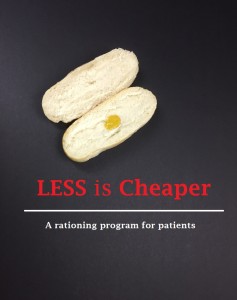 When I first heard about the report Unnecessary Care in Canada, I thought it was an April Fools’ joke. I have yet to meet a patient troubled by too much access to medical care in Canada. Trying to get an appointment to see your family doctor, if you’re lucky enough to have one, can take weeks. The only other options available to patients are the walk-in medical clinics where quality care can be hit and miss, or waiting for hours in overcrowded hospital emergency departments.
When I first heard about the report Unnecessary Care in Canada, I thought it was an April Fools’ joke. I have yet to meet a patient troubled by too much access to medical care in Canada. Trying to get an appointment to see your family doctor, if you’re lucky enough to have one, can take weeks. The only other options available to patients are the walk-in medical clinics where quality care can be hit and miss, or waiting for hours in overcrowded hospital emergency departments.
1) Who wrote this report?
The report was produced by Choosing Wisely Canada (CWC) and the Canadian Institute for Health Information (CIHI). One is a rationing program and the other a data collection and reporting agency. The Choosing Wisely® program was spearheaded by the American Board of Internal Medicine (ABIM) in 2012 to help contain spiraling Medicare costs in the United States. It’s now a global movement for cost containment also referred to as health care resource stewardship.
The CWC marketing campaign is impressive. It has a catchy tagline, “More is not always better”, and it’s presented as a conversation starter for doctors and patients to discuss unnecessary care and make wiser choices for reducing it. Partnering with medical associations and specialty societies in developing their lists of recommendations helps lend an air of public trust. It also makes it more difficult for frontline providers to criticize government cutbacks when they’re actively engaged in the process of expanding their role as rationing agents. Language is a very important tool in the campaign. Using terms like patient safety, quality improvement, harm reduction, and evidence-based are an easier sell than cost containment and rationing.
2) What is unnecessary or low-value care?
If mainstream media coverage around this report is leading you to believe that 30{590a4c0e295c39ab030a5b07b13f1fc099430ba01c5342b75da9cd83d5c77913} of medical care in Canada is potentially unnecessary, then you need to actually read the report. It only looked at data concerning eight CWC recommendations. The word “potentially” appears before the word “unnecessary” often in the report. Why? Because reviewing electronic administrative data and survey responses to assess the so-called appropriateness of care for a patient provides an incomplete picture. Patients are persons, not numbers. Making sure patients get necessary and appropriate care sounds good, right? But what is “appropriate” care? Who is deciding the “appropriateness” of your care?
Diagnostic tests assist doctors in making a diagnosis. You suffer a head injury and a brain hemorrhage has now been ruled out for you. Does that mean the CT scan or MRI of your head was medically unnecessary? Is your doctor going to be audited for inappropriate care? Is it considered low-value care because the test cost the system money and it turns out you don’t have any bleeding in your brain?
What third parties deem as “low-value” care in terms of utilization and cost, a doctor and patient can deem as “high-value” care when it comes to clinical decisions for diagnosis and treatment and the survival and quality of life of the patient.
3) Are patients in agreement with the government and doctors when it comes to unnecessary care?
According to the report, “The Choosing Wisely Canada campaign marks a point where physicians, patients and government all agree on unnecessary care.” It provides some statistics regarding patient views on unnecessary care and cites a 2015 Ipsos Reid survey conducted for its partner the Canadian Medical Association (CMA). I wanted to see a copy of the survey questions so I contacted the CMA through the information listed on the bottom of page 12. My request was passed along to Choosing Wisely Canada. They informed me that the online survey contained seven related questions, but they can’t share them because they want to publish the results in a peer-reviewed journal. I’d like to see the wording of the survey questions. I’d also like to know more about the online participants. Without additional information the numbers are suspect. Clearly, we’re not all in agreement when it comes to unnecessary care.
4) Is CWC creating evidence-based or agenda-based medicine?
A favourite buzz word of CWC is “evidence-based” which assumes the authority of organized science and leaves little room for the art of medicine. The amount of data being collected and the number of evidence-based recommendations continue to grow. Many factors can influence the evidence for these recommendations including the aim and design of the research and the data and methodology employed.
The term evidence-based can mean different things to doctors and patients weighing the risks and benefits of tests and treatments and to payers trying to reduce costs. For example, if my child has strep throat then timely access to a doctor and antibiotics are medically necessary. Let’s take a look at CWC’s Recommendation 8 backed by the Canadian Association of Emergency Physicians which states “Don’t use antibiotics in adults and children with uncomplicated sore throats.” Recommendation 4 on another list backed by the Canadian Paediatric Society states “Don’t routinely do a throat swab when children present with a sore throat if they have a cough, rhinitis, or hoarseness as they almost certainly have viral pharyngitis.” Are these recommendations an appropriate way of containing costs? When does the risk of harm from untreated strep throat outweigh the potential cost savings on a prescription for antibiotics? How many of these recommendations are causing unnecessary adverse events for patients?
For a better understanding of the evidence in CWC’s report, it’s worth reading the accompanying Technical Report by CIHI. It provides some additional information on data collection and analysis. Does the data really support their findings of unnecessary care in Canada? Putting all the fancy infographics aside, I’m not convinced that it does. The report can tell us about the utilization of publicly funded services. It can tell us about compliance with certain CWC recommendations in certain provinces. What the report can’t tell us is whether or not the medical care of individual patients was unnecessary and inappropriate.
Evidence-based medicine is more about the numbers and less about the persons behind them.
5) Does CWC promote patient-centered or system-centered care?
Health care is not free and there are limited health care resources. The CWC program is less about doctor/patient conversations and more about interventions for saving Medicare money. It’s using electronic data and algorithms to form policies and practice guidelines in hospitals. It’s performing utilization audits on doctors. It’s altering order forms and embedding prompts in electronic programs and health records to ration diagnostic imaging, lab tests, antibiotics, drugs, surgeries, Cancer treatments and life support in publicly funded health care systems throughout the world. It’s changing medical education and training by teaching future medical doctors, nurses, and pharmacists to be public health care protectionists who advocate for system sustainability and value population health over individualized patient care.
Your tax dollars are paying for Medicare. Your tax dollars are also paying for programs that are deceptively denying you access to care. When it comes to Choosing Wisely Canada, the best conversation starter for doctors and patients is this:
Are you going to treat me as a person or as a number?

